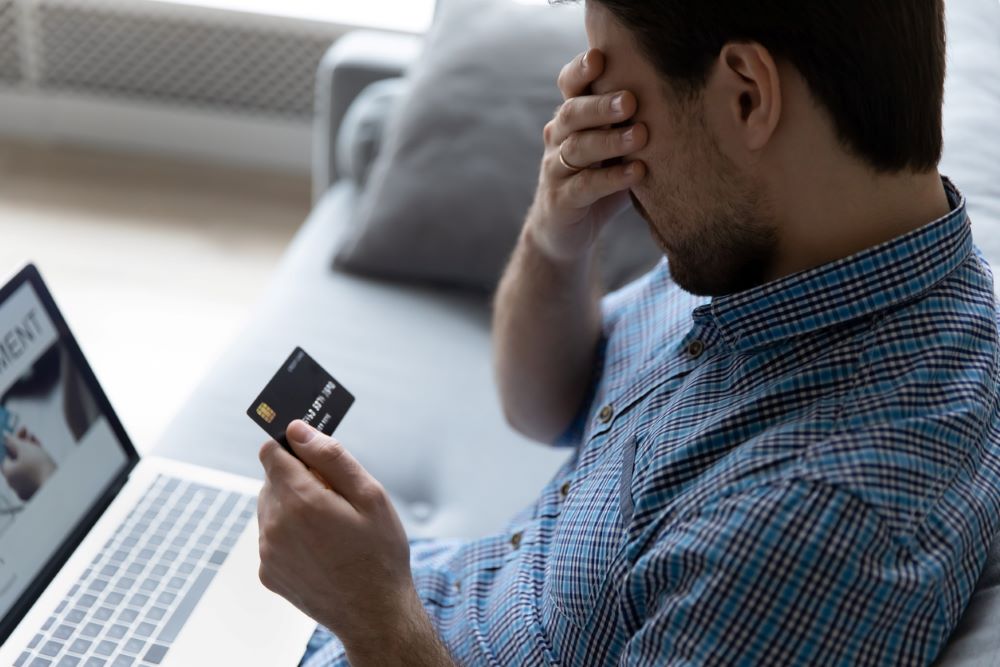Credit card fraud involves someone using another person’s credit card information to purchase goods and services illegally without their knowledge.
Credit card fraud is a very common form of identity theft that has existed for a long time. As the use of credit cards has increased over time, so has the credit card fraud rate. In 2021, the Federal Trade Commission received close to 390,000 reports of credit card fraud.
In this blog, we explain how credit card fraud can affect your credit, what steps to take if you’re a victim, and how to help avoid it.
How Can Credit Card Fraud Impact Credit Scores?
Your credit can be negatively affected by credit card fraud.
- You incur late payment charges on your credit card if used for payment without your knowledge.
- The fraudster opens a new credit card in your name.
If you fall victim to credit card fraud, it is possible you may not realize it until there are huge debts and high utilization rates that might affect your credit score.
What Are the Signs of Credit Card Fraud?
Fraudsters make use of different methods in defrauding people. Here are examples of scamming signs you should watch out for:
- Constant debit alerts or bank statements showing payments you haven’t made or authorized.
- Rejected credit card while making payments.
- Received notification of exceeded credit scam limit from your credit card provider.
How Do You Help Protect Yourself Against Credit Card Fraud?
Here are some ways you can help protect yourself from credit card fraud:
Keep Your Credit Cards Safe
Try to secure your cards in a safe place. Also, avoid being careless or placing them in open spaces.
Credit Monitoring
Make it a duty to frequently track and look through your credit reports and bank statements.
There are also credit monitoring services, like MyScoreIQ that will help you stay on top of your credit reports and scores. Credit monitoring plans include real-time fraud alerts, daily credit and identity monitoring, and provide credit reports and scores.
Verify Online Shopping Websites
While making online purchases, try as much as possible to verify that the website is legit and safe. Use only secure payment portals such as PayPal, Stripe, Amazon, GooglePay, etc.
To be on the safer side, try not to click on the “remember me” option while making payments.
Make Reports of Stolen or Missing Cards
When you discover you misplaced your cards, make a report immediately. You can also set a fraud alert for your credit card accounts in case.
What To Do If You’re a Victim of Credit Card Fraud?
As a victim of credit card fraud, you should report the fraud immediately to your credit card issuer. Once you have contacted your credit card issuer, they can issue you a new credit card and start investigating your credit card fraud case.
You also need to contact the three major credit bureaus. In addition, you want to request a credit card freeze to prevent fraudsters from opening new credit under your name.
Consider filing a police report with your local police department to help investigate your credit card fraud case. Be prepared to provide personally identifiable information and information related to your credit fraud case.
Can You Recover from Credit Card Fraud?
Yes, you can always recover from credit card fraud. First, you have to report the issue to your credit card providers as soon as possible, so they can help cancel the affected card and offer you a new one.
Also, you need to discuss your options with your credit card provider considering monitoring and investigating. Most times, banks, or credit card providers can provide a refund if the fraud is the result of the bank’s negligence. If not, the customer may have to bear the loss.
Note that you have to be vigilant at all times by taking all preventative measures mentioned above to prevent a recurrence.
Bottom Line on Credit Card Fraud
Fraudsters use credit card fraud to trick people of their money through payment cards. They do this by hacking and stealing people’s information, cloning their cards, making attractive offers, hacking through websites, etc.
This can, however, help be prevented by safeguarding of cards, reporting lost or stolen cards immediately, constant credit monitoring, setting credit alerts and using secure portals for online transactions.











